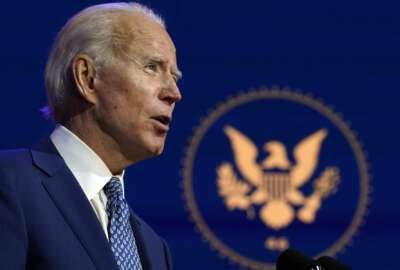
Union in ‘holding pattern’ as agencies decide how to rescind Trump executive orders
The American Federation of Government Employees is pleased the Trump-era executive orders that limited collective bargaining and cut official time are gone. But the...
Former President Donald Trump’s 2018 executive orders, which limited collective bargaining and official time, are, technically speaking, a thing of the past.
President Joe Biden rescinded them with a stroke of the pen on his third day in office, signing a new executive order last week that recognized “union organizing and collective bargaining.”
Biden’s new executive order called on agencies to “suspend, revise, and rescind” any actions they took over the last three years that effectuated those Trump-era orders.
But until agencies review those actions and make formal plans to return to the status quo, unions are still, in essence, living under Trump’s 2018 executive orders. The three largest federal employee unions have all said they hope agencies will return to the bargaining table to renegotiate new agreements that are free from the 2018 orders.
What exactly that process entails is still an open question.
“What that means is going to vary depending upon who’s in charge of the agency and the pressure that they believe that they’re receiving in order to make whole their union partners in accomplishing the mission,” David Cann, director of field services and education for the American Federation of Government Employees, told reporters Tuesday. “Hopefully the Office of Personnel Management will issue guidance, which instructs agencies to return to the table shortly.”
Several large agencies either signed or imposed new contracts or directives during the last few years, which, in some cases, slashed official time banks and forced some local unions to find their own office space.
According to a recent OPM report, agencies cut official time use by 28% in 2019 while Trump’s executive orders were still enjoined in federal district court.
Nicole Cantello, president of an AFGE local representing employees at the Environmental Protection Agency in the Great Lakes region, said the Trump executive orders forced the union to leave the agency’s office space and create “virtual” office hours instead.
With official time banks reduced, Cantello said she and her union colleagues worked nights and weekends to respond to employee concerns.
“Everyone in the union had two jobs: EPA worker and union official,” she said.
Agencies could reverse course from the Trump executive orders through a variety of methods.
“It could be bargaining. It could be offering to revert to the previous contract,” Cann said. “It could be meeting with the union to engage in procedures and appropriate arrangements and negotiations about how to make sure that they immediately suspend those effectuations, whether or not there’s no official time, no office space or not giving people the opportunity they need to have full due process rights under the contract. What that looks like is a process that’s evolving. The union really needs to be a partner.”
No agencies have reached out to AFGE to discuss the new executive order or their plans to deal with the old ones, Cann added.
“So far most agencies have been in a holding pattern, saying they don’t want to engage in wholesome negotiations regarding the new executive orders because they’re awaiting instruction from their legal teams,” Cann said.
Ralph de Juliis, president of the AFGE council that represents customer service representatives at the Social Security Administration, said he asked the agency to return to the bargaining table to begin the work of negotiating a new contract.
SSA labor officials told him they’d discuss the implications of Biden’s new executive order at their next union-management call scheduled for next month, de Juliis said.
He also flagged other executive orders from the Biden administration, which instruct agencies to observe social distancing practices at federal workspaces and require the Occupational Health and Safety Administration to revise pandemic guidance for employers.
Other AFGE local leaders are asking their agency leadership about revisiting their contracts.
Linda Ward-Smith, president of the AFGE local representing employees at the Department of Veterans Affairs in Las Vegas, said she asked the head of her local VA about returning to the bargaining table.
The agency told her the VA won’t resume negotiations until it’s “moved to do so,” Ward-Smith said.
“As a union president, I feel like I’ve been fighting a war for the last three years. I’m very thankful that we now have a new administration who we believe will sit at the table and listen to our concerns and basically follow the law,” she said. “That’s all we’re asking for. Follow the law. Give us the rights that we feel we’re entitled to based on law, rules and regulations. We’ll agree to disagree sometimes.”
Even if union representatives are still experiencing the day-to-day impacts of Trump’s 2018 executive orders, they’re hopeful the dynamic between labor and management will change.
“As labor leaders, there is a certain amount of trust that we need to regain. During these last four years, I think I’ve lost not only trust, but respect, because of some of the things that our members were put through,” Ward-Smith said.
Overall, AFGE wants to revisit all new contracts that were written or drafted during the administration, and it’s optimistic the Biden administration has set a new tone.
“We are extremely heartened to see the executive orders that have come out of the Biden administration already,” Cann said. “While there’s a lot of hard work to do and a lot of trust to rebuild, we’re cautiously optimistic based on what we’ve seen of this administration [as] meaningfully engaged in being labor partners.”
Copyright © 2025 Federal News Network. All rights reserved. This website is not intended for users located within the European Economic Area.
Nicole Ogrysko is a reporter for Federal News Network focusing on the federal workforce and federal pay and benefits.
Follow @nogryskoWFED





